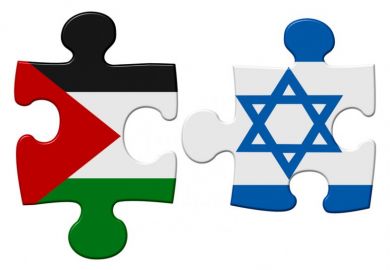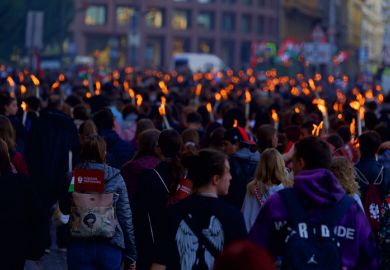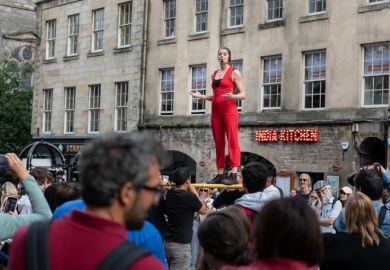The difficulties that universities face globally are well documented – financial pressures, marketisation and growing hostility towards experts, to name a few – but in the case of Birzeit University, located in the West Bank, hostility is inescapable and the simplest aspects of university life can prove the most difficult.
Having started life as a girls’ school in 1924, the Palestinian institution became a university in 1972, after the Israeli occupation of the West Bank and the Gaza Strip in 1967.
Mirvat Bulbul, Birzeit’s vice-president for administrative and financial affairs, told Times Higher Education that under occupation there were “many oppressive measures” but the ones that presented the “most challenges” related to academic and student mobility.
Israel continuously denied work permits to overseas academics who wished to work in Palestinian universities, Dr Bulbul explained. “We are denied the diversity that this brings,” she said. “You cannot come to Palestine on anything other than a tourist visa – and even then, that does not guarantee you entry.”
Meanwhile, the blockade of Gaza and other restrictions on mobility have meant that the pool of Palestinian students from which Birzeit can recruit has shrunk considerably. “There are road closures, check points…we have no continuity within the area. As a result, most [Palestinian] universities have become extremely local,” Dr Bulbul said.
Unlike some other conflict-ridden parts of the Middle East where technology has played an important role in supporting higher education and developing international links, global technological advances have been little help in Palestine, Dr Bulbul continued. For example, broadband and 3G communications were not allowed into the Palestinian territories until last year.
“Telecommunication companies invested in infrastructure that they were not allowed to use for 10 years. These are very basic conveniences that Palestinians are denied,” she said.
These constraints, combined with a paucity of financial resources, leave the university heavily reliant on tuition fees.
“We see Israel’s occupation as a colonial hegemony of every aspect of Palestinian life. It’s not just a territorial conflict; it’s more than that. We are talking about resources, culture and identity,” Dr Bulbul said.
However, these challenges mean that higher education is even more valued and valuable in the West Bank, Dr Bulbul argued. “The university is a safe haven. It is a place where students and faculty and staff practise a lot of democratic values, in contrast to our surroundings,” she said. “By keeping that momentum, it allows a lot of creativity, freedom of expression, student and faculty collaboration. It’s a really bright spot.”
“We believe we are leading on resistance and liberation – and we are paying the price for that – but they are essential.”
To continue operating despite the repressive measures, the university has become more versatile, according to Dr Bulbul. There have to be adjustments to the academic calendar, “and people accept that, it has become the normal practice”, she explained. For example, because Israel denies both staff and students long-stay visas to come to the university, they must visit on three-month tourist visas. “We often have to adapt teaching and student learning to three-month blocks,” she said.
Dr Bulbul was also adamant that the challenges faced by Birzeit and other Palestinian institutions should not be used as an excuse for poor standards among staff or students.
“Students and faculty, even administrative staff, apply rigorous standards to make sure we are doing the job we ought to do, in spite of the adversity all around us,” she said.
Dr Bulbul pointed to the high level of citations gained by research from the university. “This is related to the relevance of the themes we work on,” she said. The university’s institutes focus on policy-oriented research on the economic, social and human development of Palestine. Its research into conflict zone issues – such as water, environment, public health, law, democracy and human rights – also has global relevance.
Birzeit has recently launched its first PhD programme, in social sciences, in an attempt to boost the voice of Palestinian researchers in these fields.
“We do a lot in social sciences that go undetected because it’s in Arabic language, and Arabic journals do not get the same exposure. But we believe that we have a great contribution to make in this area,” Dr Bulbul said.
She concluded: “It’s a struggle and challenges change, but we have been doing this for 40 years. We are agile, we adapt. Our predicament attests to the advantages that higher education can bring. I think people take it for granted that these things are there, but for us, every little thing we have is a blessing.”
POSTSCRIPT:
Print headline: A haven amid the occupation
Register to continue
Why register?
- Registration is free and only takes a moment
- Once registered, you can read 3 articles a month
- Sign up for our newsletter
Subscribe
Or subscribe for unlimited access to:
- Unlimited access to news, views, insights & reviews
- Digital editions
- Digital access to THE’s university and college rankings analysis
Already registered or a current subscriber? Login








